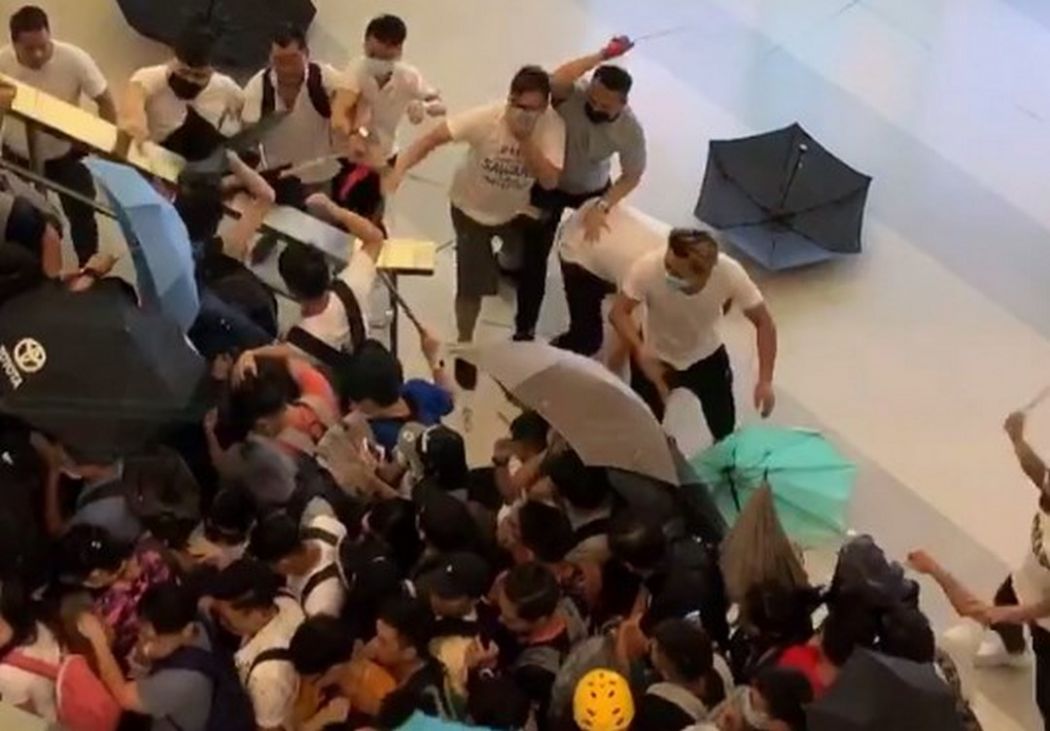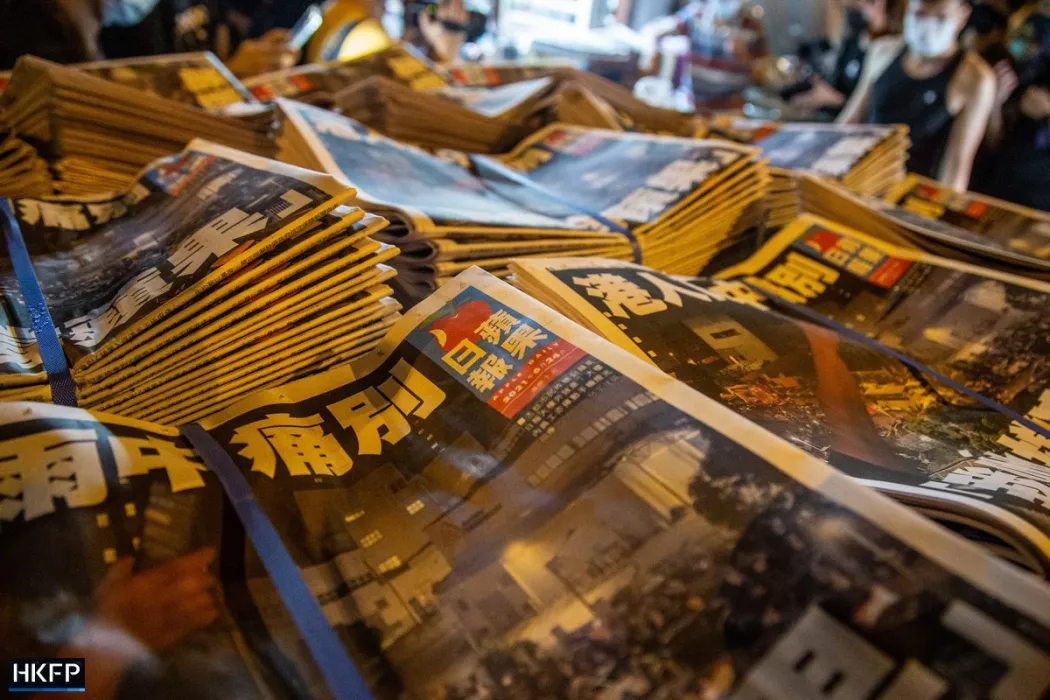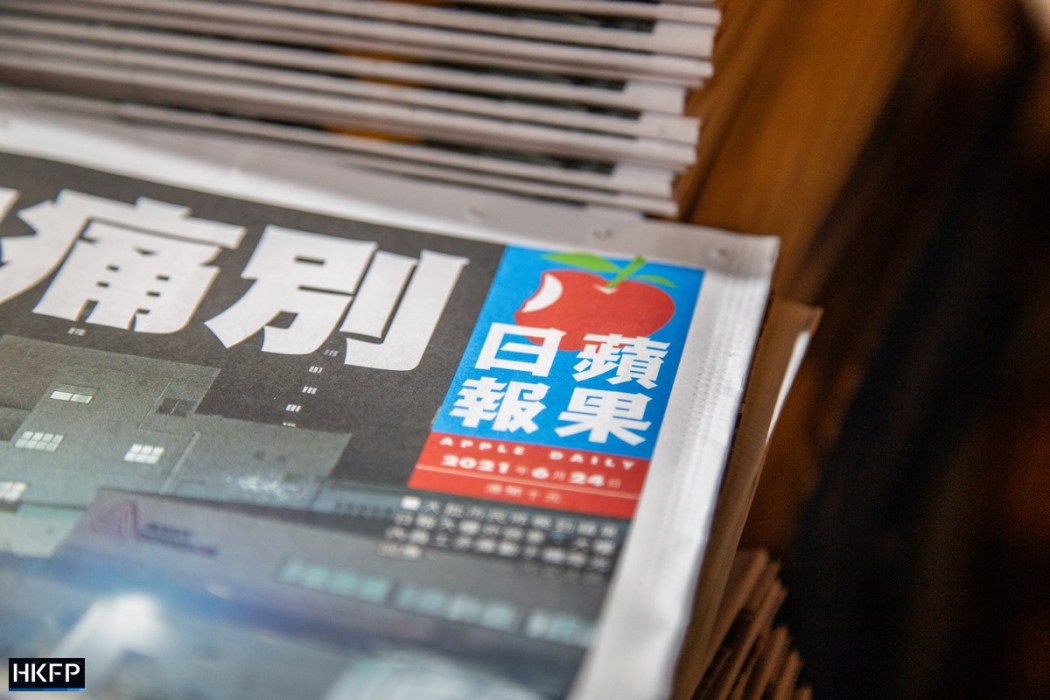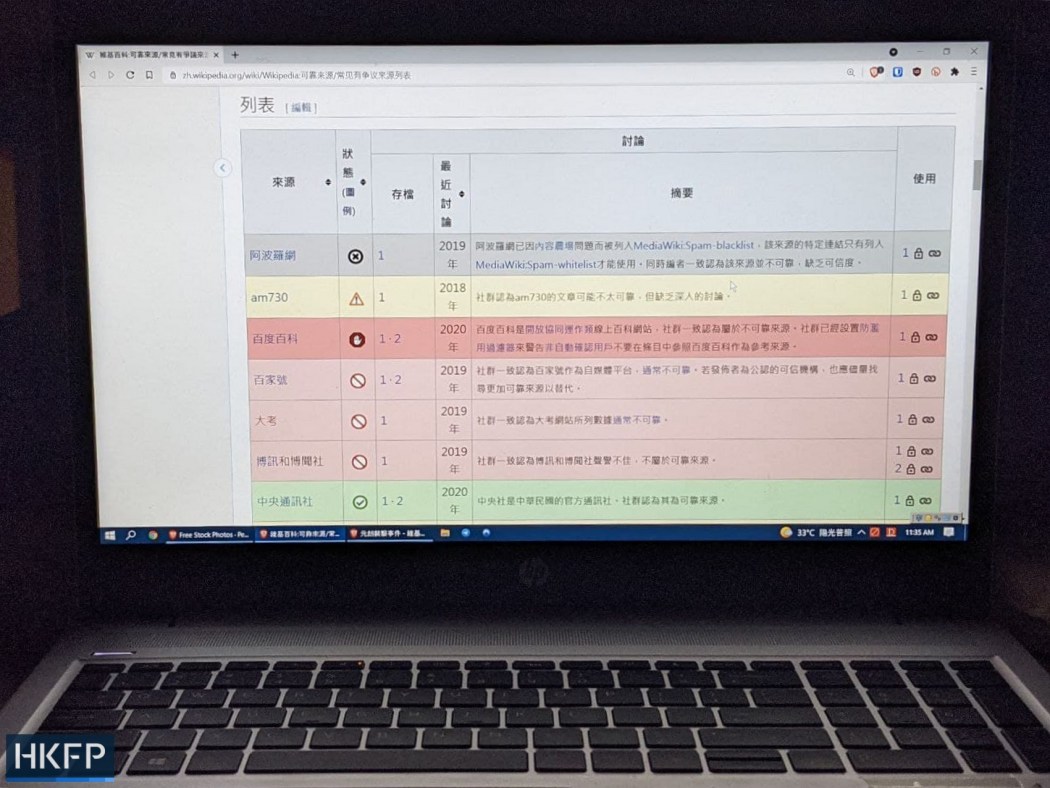As Hongkongers reckon with the closure of one of the city’s mainstream news outlets, drastic political changes and a sweeping national security law, the city’s keyboard warriors on Wikipedia are also coming under pressure.
Battles between competing editors of the crowd-sourced encyclopaedia’s articles about Hong Kong political events have been a daily occurrence since the beginning of the 2019 anti-extradition bill protests.

Now there are threats that the keyboard warriors may soon face real-life consequences: their mainland counterparts have threatened to report Hongkongers who are working to preserve information and narratives on Wikipedia to the city’s national security police hotline.
The website now hosts over one million articles in its Chinese edition alone. Entries can be written and edited by any internet user as long as these are supported by reliable news sources, although no original research is allowed.
But since Hong Kong’s Apple Daily newspaper and its massive internet news archive disappeared in June after its top executives were arrested under the security law, Wikipedia volunteers in Hong Kong say they face increasing problems finding a diverse range of reliable media sources to cite.
Meanwhile, their mainland counterparts are pushing for the use of Chinese state media as reliable news sources to channel their version of events.
Hong Kong users also fear that it will become harder for them to get elected as administrators on Wikipedia – a role which gives them power to adjudicate on editing decisions and invoke the website’s guiding rules and principles – because the Chinese version of the website is dominated by mainland users.
A Chinese Wikipedia article about the Yuen Long MTR mob attack in July 2019 had recorded a whopping 1,912 edits as of July 8, with 473 media sources cited in footnotes.
Its “talk page” features impassioned debates over the editing and sourcing. “I support using ‘terrorist attack’ [to name the event], it is not a minority viewpoint but is used by local media, reporters and scholars,” a user wrote, citing nine media sources to support the argument.
Another user under the handle “Wo Ping Zi Soeng” brushed off these sources, saying they were opinionated. Those news reports, he said, were all from Apple Daily, which he suggested was unreliable. The pro-democracy newspaper is considered biased by supporters of the pro-establishment camp. The debate lasted for well over a month.
‘Reliable sources’
Some media sources cited by the Chinese edition of Wikipedia are categorised on a Reliable Sources Noticeboard, or RSN. The RSN places media outlets in five categories: level 1 websites are considered blacklisted and prohibited from citation, while level 5 websites are generally considered “very reliable.”
Categorisations are the result of long discussions, ending in consensus, among the editors. Apple Daily, for example, is split into two categories: its political news reports are labelled “semi-reliable” as they “may involve opinion,” while editors agree that its reports on non-political issues are “reliable.”
The reliability of Chinese state media including the Global Times is labelled “no consensus” as editors could not reach a conclusion.
For writers and editors, the reliability of media sources determines whether their work can survive an edit war.
In response to an enquiry from HKFP, one user “Wo Ping Zi Soeng” said in an email that Apple Daily’s political reporting carries “clear standpoints” and is labelled as “level 3” sources with no consensus over its reliability, “therefore it is recommended to replace it with more reliable sources such as Ming Pao, iCable news,” he said. He also believes the closure of the paper does not affect Wikipedia citations, as there are other news outlets available.
“Editorials and opinion articles are not able to support facts as reliable sources on Wikipedia,” he said.
One English Wikipedia article described the death of a cleaner hit on the head as Hong Kong protesters and opponents hurled bricks and other objects at each other in 2019.
A veteran Hong Kong editor, Deryck Chan, said writers who were more sympathetic to the protests described the incident as the unfortunate death of a man caught in the crossfire, while those with pro-establishment views wrote that the man was killed by a brick hurled by pro-democracy protesters.
Chan is an administrator for the website’s English and Cantonese editions and is now based in the UK.
Pro-establishment editors were able to cite sources, particularly through state-run CGTN, TVB and even the SCMP which suggested that the brick was thrown by pro-democracy protesters, Chan said.
Narratives, information or images widely accepted “on the ground” in Hong Kong may instead be “taken as highly suspect under Wikipedia rules,” Chan said, as these may be published on social media by citizen journalists but remain disputed by established Chinese-owned or pro-government media.
“Wikipedia was built on the premise of being a tertiary source, which means one of the central tenets of Wikipedia’s governance is ‘verifiability, but not truth’,” Chan said.

“If governments and corporates are sufficiently powerful that they can dictate what goes into mainstream reliable sources, then they indirectly dictate tertiary sources like Wikipedia in terms of what they can and cannot say,” he said.
Yet it is inevitable that some biases become embedded in Wikipedia articles, said a veteran Wikipedia administrator who asked to be identified only as AT. “It’s a daily battle where users find media sources of one political stance to support their views,” he said.
The Wikipedia article on the Yuen Long attack, for example, may be read as sympathetic to pro-democracy camps because it cited Apple Daily heavily, he said, “but Apple Daily reported more on it with more details.”
The key to writing a good Wikipedia article on a contentious issue, AT said, is to present controversies as they are by citing a wide range of perspectives, rather than attempting to draw conclusions from them.
One news source trumps the next
The closure of a major pro-democracy newspaper creates new challenges for Wikipedia editors in itself. “There will be fewer sources with opposing viewpoints. Or those sources are less detailed than Apple Daily was on certain issues,” said AT, who spoke with HKFP under his Wikipedia user handle. “But these are not problems that could be solved on Wikipedia.”
As Apple Daily closed last month, some users attempted to purge Wikipedia of news outlets deemed pro-democracy. One user named “Walter Grassroot” started removing Apple Daily news links in articles en masse, hours before the newspaper’s official shutdown on June 23.
“I’d like to ask why you removed Apple Daily links from several entries,” one user wrote. Walter Grassroot replied that the removals were a result of an unintentional glitch. “I will be more cautious later, thank you for your reminder.”
At the time of writing, Walter Grassroot’s Wikipedia profile indicated that he was from China’s Shanxi province, educated in the US and was now living in Jiangsu.

“Many people will think that this person did it out of a political motive,” AT said.
In his user history, Walter Grassroot left a comment supportive of another user MINQI, who appeared sympathetic to pro-China viewpoints, saying: “People supporting Taiwan, Hong Kong, Manchu and Falun Gong independence exist because of financial support in the background” and they must set up a foundation for efficient “large scale clean-ups” of articles in the future.
Another pro-democracy local news outlet currently marked as “reliable,” Stand News, also faces being bumped to a lower category. User MINQI argued that the digital news outlet is “pro-democracy,” while another said: “[I] don’t agree that the Stand News’ news reports are a reliable source. According to Global Times, Stand News published severely biased reports that attacked Hong Kong police.”

A feature article published by the news outlet about Wikipedia also became the subject of the debate. Users said their online comments were quoted out of context and the article was “seriously inaccurate.”
Information supported by a less “reliable” news source could be replaced if another one from a higher reliability category could be used instead. In the war to set narratives using news sources that may have political biases, whether pro-Hong Kong or pro-China, the question of which news outlet gets a seal of “reliability” becomes a key battleground.
“The reliance on external reliable sources is confining Wikipedia into a range of narratives, where someone with overwhelming governmental or commercial power can bend the narratives without violating any of Wikipedia’s rules,” Chan said.

Wikipedia is governed by a set of principles – such as a neutral point of view and verifiability — and complex rules to ensure that its information remains largely reliable and is free from manipulation.
Which argument prevails in debates on content depends ultimately on administrators’ adjudication over whether users have followed Wikipedia’s rules, or have cited relevant and reliable sources. Then – ideally – the administrators – reach a consensus through discussion.
“It’s like a court case,” said another Wikipedia editor using the pseudonym Ken. The majority doesn’t always win.
Elected administrators
Administrators – who are elected, experienced users – may give advice, close discussions, decide whether to remove an article, offer assistance, ban users who violate rules, or place articles under electronic protection to prevent editing wars and vandalism.
They are elected by Wikipedia members from each language edition but must secure over 80 per cent support. Elections may happen whenever valid nominations are received. Administrators who are inactive for long periods can be removed but are difficult to dismiss.
The Chinese edition of Wikipedia currently has a total of 76 administrators, 17 of whom are from Hong Kong, 20 from Taiwan, and 38 from mainland China. One is from Macau.
AT and Ken both said although these gatekeepers of Wikipedia debates have been doing a fair job, it has become harder for Hong Kong or Taiwan users to get elected from a pool of voters dominated by users from the mainland, especially those not sympathetic to Chinese establishment narratives.
The election of a Taiwanese user “Peacearth” – based in the US – last December became an indication of those challenges.

“It’s hard to say whether there were political motivations [in the voting], but there must be geographical reasons,” AT said. The polls showed the majority of those who voted against the user were from the mainland, and the candidate ended up two per cent short of the required number of votes of confidence.
The election was extended for a week after administrators observed suspected canvassing from outside of Wikipedia, with a large number of voters casting their ballots just before the polls were scheduled to close. Elections rarely see over 100 votes, AT said, but this candidate had a total of 157 votes.
One user who voted against Peacearth left a comment: “Their butt is not in the right place, not to be trusted.” “Then where should their butt be placed?” one user replied. “Perhaps in front of the Communist Party,” another said.
Another user who also voted against the candidate, wrote: “At this point in time, under such international situation… it’s hard to support this candidate,” without further elaboration.
Four of the six administrators elected since 2019 were from the mainland. Only two Hong Kong users were elected out of six candidates from the city during this period, AT noted. One of the two had clear views supporting the Chinese government, while the other never expressed political views.
“You get factions forming along existing social-linguistics lines,” said Chan, the administrator for the English and Cantonese editions.
The bar to enter the race is high. Users are required to have 3,000 edits in their track record and will have to contribute significant personal time as a volunteer. The number of Hong Kong users who qualify is limited. If the users are pro-Chinese Communist Party, AT said, “the headwinds [to be faced in getting elected] are relatively weaker.”
A spokesperson from Wikimedia Foundation — which owns the Wikipedia websites — told HKFP its volunteers typically evaluate sources to determine their reliability, and its consensus-based model allows volunteers to collaborate, making it “difficult for a single group or authority to control” its content.
“We defend the editorial independence of Wikipedia volunteers to determine what content should be included on Wikipedia,” the spokesperson said.
NSL hotline
Online factions and edit wars, however, may be giving rise to real life consequences. Screenshots that surfaced on Wednesday showed users on the Chinese QQ messaging app for mainland Wikipedia editors discussing reporting their Hong Kong peers to the city’s national security police hotline.

“We should report those from the Hong Kong user group,” a QQ user under the handle “Walter Grassroot” wrote after another user posted an image of the hotline’s details. “Nice idea,” another replied. HKFP was unable to independently corroborate whether the users sharing the same handle on QQ and on Wikipedia were controlled by the same individual.
In response, users from the officially recognised Wikimedia Community User Group Hong Kong said in a public Telegram chat that they had contacted the Wikimedia Foundations’ Trust and Safety team at Wikipedia headquarters.
Walter Grassroot of Wikipedia declined a request for interview in an email to HKFP and denied having knowledge of messages about reporting Hong Kong users to the national security hotline.
“What’s the national security hotline about? What was reported on QQ? Did anyone send pornographic images? Sorry, I apologise for not understanding what’s going on,” he said, without acknowledging questions about allegations that he removed Apple Daily news links.
“I like Hong Kong very much and visited several times every year before the pandemic… but I don’t know much about the situation with Hong Kong’s Wikipedia.”
A current and a former board member from the Wikipedia Hong Kong user group affiliated with the Wikimedia Foundation told HKFP that after they received evidence proving that the QQ discussion was authentic, they convened an urgent meeting with members and provided them with guidelines to prevent doxxing.
The two users — Arthur Cheung, known under the Wikipedia handle “Dasze”, and William Chan known as user “1233” — said they were gravely concerned that a user involved in the QQ discussion had multiple levels of administrative privileges on Wikipedia, and may be able to use such access to trace the real identities of Hong Kong users, although the user does not have direct access to users’ IPs or personal data: “Our user group acted instantly and accordingly as this will greatly threaten the physical safety of Hong Kong-based editors,” they told HKFP. “We value the safety of our members as top priority.”
“Such an act also violates the fundamental values of collaboration and trust which allow us to construct, contribute and collaborate within Wikipedia,” their statement read. “We feel extremely shocked and concerned that the one who shall be the defender of the Wikipedia Community was involved in such an atrocious discussion and act against the values of the Wikimedia Movement.”
A Wikimedia Foundation statement released last July – after the national security law was enacted in Hong Kong – stated that the foundation would not provide any data in response to requests from Hong Kong authorities “unless we were certain of the request’s legal validity after a thorough analysis of this new law, and also a full assessment of applicable law, human rights standards, and the rights of our community members.”
“We only disclose nonpublic user information if we believe that there is a credible and imminent threat to life or limb that the data would help prevent, or if we are required to under applicable and enforceable law in our jurisdiction,” the statement read.
In response to HKFP’s enquiries, a Wikimedia Foundation spokesperson said its Legal as well as Trust and Safety teams “consistently support [volunteers] in ensuring their safety and security for their contributions to Wikipedia, with a particular focus on our volunteers in Hong Kong at this time. The Foundation has been closely monitoring the situation in Hong Kong and has been in touch directly with volunteers.”
However, details cannot be made public in order to protect the privacy and safety of the volunteers, they said, adding that it retains “very little” data about Wikipedia users, and only for a short time.
Correction 17:10: A previous version of this story misstated that there are six million Wikipedia articles in Chinese. It should be over one million.
Update 23.7.21: This story has been updated with Wikimedia Foundation’s comments.
Support HKFP | Policies & Ethics | Error/typo? | Contact Us | Newsletter | Transparency & Annual Report | Apps
Help safeguard press freedom & keep HKFP free for all readers by supporting our team
























